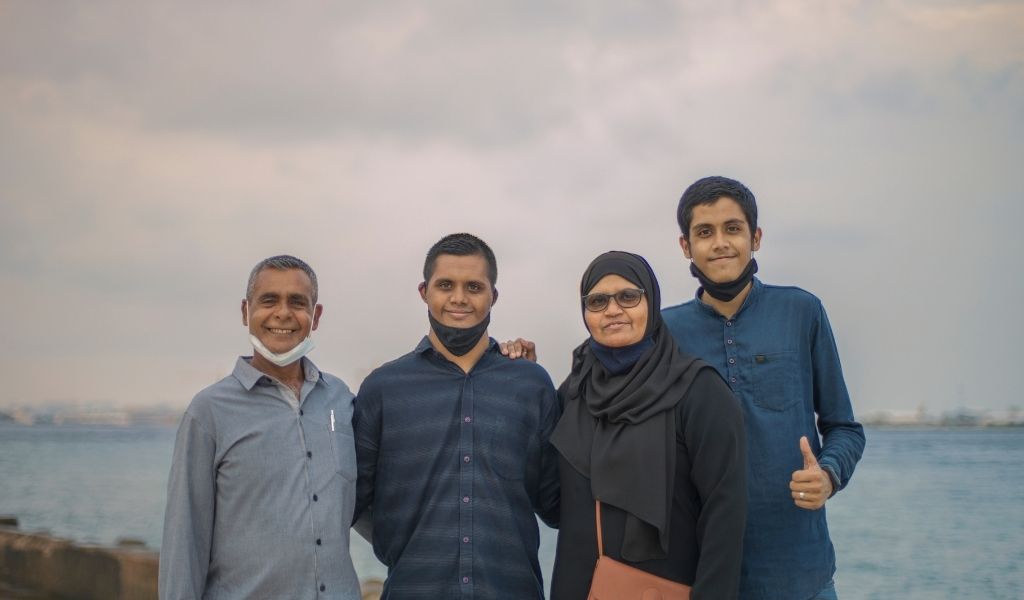
Haashim: An Individual With Down Syndrome Who Showcases Many Talents Of His Own
If you have a look at the history, you can see that individuals with disabilities or suffering from certain type of illnesses were subject to all sorts of inhumane discrimination in all parts of the world – including the Maldives. Of course, Down Syndrome is no exception when it comes this – especially owing to the physical features and mental characteristics which stands out in a person who has the condition that alienates them from the rest. To achieve the inclusivity, we have now, many battles have been fought by a lot of brave people. Hence, on the occasion of World Down Syndrome Day, this time we are jumping back in time to a little over 20 years ago to share the story of Ibrahim Haashim – an individual who has down syndrome that has fought a difficult battle with support from his family.
Haashim was born in his island, Noonu Velidhoo – which plays a significant role in how his story turns out. Mind you, at that time, Maldives was pretty backwards as a country as well as a society whereas the situation was even worse in the islands when compared to the capital, Male’. It was not a community that understood what ‘down syndrome’ was nor how to care for a child that had the condition. This was added with the lack of necessary facilities such as proper healthcare and education.
As a baby born with down syndrome, Haashim grew up slower than other children of his age. Children with down syndrome have reduced muscle tone, which can delay the development of their motor skill. As a result, when Haashim learnt to walk, he was five. In addition to this, due to the cognitive delays posed by the condition, when he learned to talk, he was around nine.
By this time, he already has a younger sibling who had caught up to him and together they, Haashim’s mother enrolled them into school. At first, things were going good. Haashim loved going to school and it made him double the excited that he got to go with his sibling. Textbooks also interested him, immensely whereas he liked to tracing letters from tracing letter books. Eventually, though, parents started complaining that he was too old to be in the class. The school management, fully understanding of his cognitive delay – told Haashim’s mother that they needed to bump him to a class where there were children of his age. Even though it made her worried, because Haashim loved going to school so much, she reluctantly agreed. It was not until long since then, the school had asked Haashim’s mother to hold him back at home as parents had always something to complain about when it came to Haashim. Moreover, Special Education Needs (SEN) classes were non-existent back then – putting things to a dead end.
Multiple days, Haashim questioned why he was not able to go to school anymore as he could not comprehend why he had to stay back while his siblings went on. There were days he would cry to go to school. Sometimes, he would also sneakily put on his school uniform and try to go to school on his own – that is until his mother catches him. At night when everyone went to sleep, he would quietly wake up and take out the school books to try to trace letters and such as well. For Hashim’s mother and the rest of his family, this was paining to watch.
Whilst the community had decided that Haashim could not attend school, Haashim’s mother made sure he did not stay idle at home. Starting from a young age, he learned how to do all household chores from cooking to cleaning to doing laundry and such – which he continued to do so every day along with his mother. Sometimes he would also help his father with menial construction works. He also loved staying active by playing different types of sports.
Haashim’s family migrated to the capital when he was much older. During his time in Male’, he has had the opportunity to play sports alongside other individuals with special needs. Haashim is particularly enthusiastic about football and badminton. He has actually gone abroad to represent the country once at a sports competition – without his mom or a family member. Something Haashim, is very proud of and an experience that fills with him with joy up until this day every time he thinks of it.
Moreover, now that Haashim’s mother is not in the best of health, he undertakes all household chores to make sure that his mother is well-rested.
Now 29-years-old, Haashim who has lost his chance at proper education dreams of a day where he could find employment of some sort. His mom, however, still remains skeptical about the idea as she does not trust the community that already turned its backs on Haashim once. As part of the same community, we must take action to gain this trust back and build back better as an inclusive and safe environment for everyone.